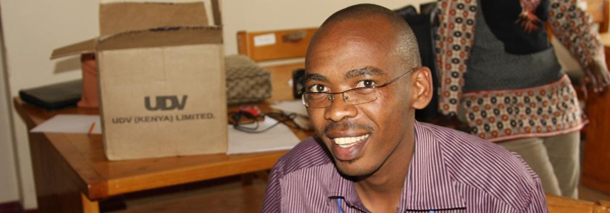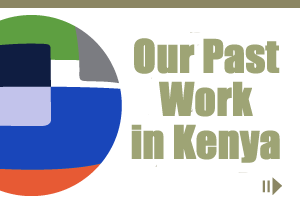In December 2011, the Internews Conflict Sensitive Journalism project awarded Kioko Kivandi a travel grant to Kiryandongo, Uganda. Kioko, the station manager of Amani FM in Nakuru, wanted to report on the state of Kenyan refugees who fled to Uganda during the 2008 post election violence (PEV) and have never come back to their home country.
In May 2012, Kioko was awarded Best Radio Journalist of the Year in the category “Good Governance” at the Annual Media Council of Kenya Journalism Awards for his three-piece story on the Kiryandongo refugee camp.
Brice Rambaud of Internews in Kenya met the newly awarded journalist and captured his first feelings about his award.
Brice: Kioko, you have recently received an award as the best radio journalist in the category “good governance”. What does that mean for you?
Kioko: I am so excited about the whole process and the fact that my efforts got recognized at a national level. This being the only prize that went to community media, for me it makes all the difference. Even journalists in community or regional media can compete on an equal footing with their counterparts in the mainstream or national level.
The award on another scale challenges me the more to reflect on the tenets of good governance and democracy as a whole in Kenya. Specifically I feel challenged as a journalist to contribute towards a ‘good governance’ environment so that the events of 2007/2008 post election violence are not repeated out of mistakes I may commit as a journalist.
Finally this award gives me much more responsibility to follow on the resettlement process for the internally displaced persons (I.D.P’s) on peace and integration in the whole country as we move towards the next general election.
Brice: What was your story about?
Kioko: The story was about the whereabouts of the Kenyans who fled to Uganda following the post election violence and have never come back. They have since been living in a refugee camp (settlement) in Kiryandongo, about four hours drive from Kampala on your way to Gulu. That’s North West Uganda.
These Kenyans (refugees) were those who lived in Busia, Malaba and on the Kenyan-Uganda border and found their way to Eldoret and hence their passage to central Kenya, which was impassable during the violence.
I did three pieces from this trip but submitted this one. These people feel the government has forgotten them. The story touched on how they had tried ‘negotiating’ with the government for their coming back in vain analyzing the social welfare services (schools, security, water) they wanted put in place before they could come back. It also touched on their desire to come back home. The fact is: Uganda is foreign to them, irrespective of the help they were getting from UNHCR at the camp and from the host government. The story concluded with a last plea to the government, that should the country get to elections before they came back home, they should be assisted to vote while still in Uganda. As their chairman put it “we still love our country.”
The other two stories were on why the Kenyan refugees are afraid of coming back home even if they have such a desire (fear of the ICC process etc) and on their take on the ICC process with a word from the court that we should not take it for a community court.
Brice: Why was it a good story? What made the difference?
Kioko: Well, I wish the panel gave me this response! It’s not easy to evaluate yourself. Anyway, I think it starts with the initiative from the word go. Imagine travelling all the way to Kiryandongo to get a story about people you are convinced not much is being done or discussed about by fellow citizens and policy makers. So it’s what we would call a thought outside the box coupled with the effort to go outside my normal comfort zone.
I also think the story had a powerful narrative. It was like a piece of cloth with patches that are neatly woven to each other. It was a real story with a beginning where they say how they feel the government has forgotten them; a middle where they support their argument while showing how they have struggled to come back; then a conclusion as they suggest alternative measures to the government.
The story had the right of reply from the government side, so it was not just them talking. You know, a way of balancing it. I also think I did my best to describe the setting, to kind of create those mental images for the listener so he can walk with the “narrator” in the script through actualities. I also think I got very good responses from the interviewees.
Brice: Is the IDP situation an important theme for you? What can journalists do to follow up on IDPs stories in the country?
Kioko: The I.D.P situation is a very important theme for me, partly because I work in the Rift Valley that seems to be symbolic with community ‘rifts.’ Secondly the I.D.P theme is intertwined with democracy and governance an area I have lots of interest for.
As a follow up on the I.D.P issue in the country I think journalists in Kenya need to ask for sabbaticals and write books analyzing the whole process. I mean how Kenya found itself in that unprecedented and unfortunate situation; how they covered it and the lessons they learnt from it.
But more specifically journalists need to follow on the inside story of resettlement; the embezzlement of funds; the start of a new life for those who finally went to their farms as integrated I.D.P’s; for those who never went back to their farms the big question has been “who is holding those farms?”; for the I.D.P’s who have bought plots in peri-urban centers like those at Pipeline, Nakuru. What do they plan to do in the future; what lessons especially on integration can we draw from their experiences now that another general election is around the corner; for my guys in Uganda: will they ever come back home?
Brice: You produced this story thanks to a travel grant to Uganda awarded by the Internews conflict sensitive journalism training team. What was Internews’ role in the story production, and maybe in the award recompense?
Kioko: Internews assisted so much in shaping the idea. I worked with Trainer Mary Kiio who edited the scripts for me. I should also say we timed the stories so that they aired on the very last days before the I.C.C gave the confirmation of charges verdict we had all been waiting for in January 2012. At that time the suspects were then six Kenyans believed to have had the greatest responsibility in P.E.V.
In a very special way then I wish to thank Internews for believing in me and assisting my growth as a journalist. I then wish to dedicate this award to all the people whose lives were negatively affected by the P.E.V. My prayer is that we will never have to walk that path again.




